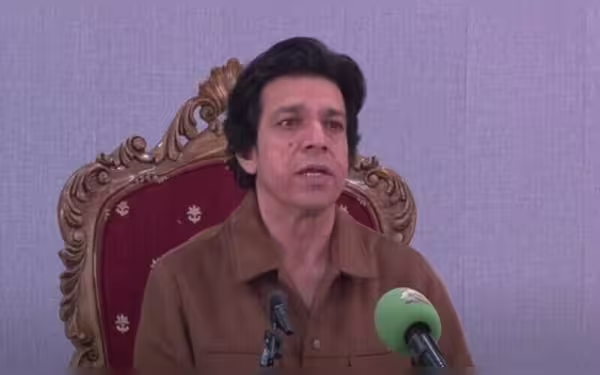Sunday, November 24, 2024 06:55 AM
Senator Vawda Claims No Release for PTI Founder on November 24
- Vawda doubts PTI leadership's commitment to founder's release.
- Protests on November 24 deemed ineffective by Vawda.
- Concerns raised over foreign intervention in domestic politics.
 Image Credits: gnnhd
Image Credits: gnnhdSenator Faisal Vawda asserts no release for PTI founder on November 24, criticizing party leadership and questioning protest effectiveness.
In a recent press conference held in Islamabad, former federal minister and Senator Faisal Vawda made a bold statement regarding the anticipated release of the Pakistan Tehreek-e-Insaf (PTI) founder on November 24. Vawda asserted that no one would be released on that date, citing a lack of sincere individuals within the PTI who are willing to advocate for their leader's freedom. He expressed his skepticism about the party's current leadership, suggesting that they are merely putting on a show under the pretense of protests.
Vawda's comments come at a time when the PTI is facing significant challenges. He remarked, "Nothing is going to happen on November 24. PTI leadership is inactive and merely staging drama under the guise of protests to secure the release of the PTI founder." This statement reflects a growing frustration among party members, as Vawda claimed that many are more interested in securing personal relief than genuinely supporting their leader.
During the press conference, Vawda emphasized that regardless of the number of people who might join the protest—whether it be 50,000 or five million—it would not change the outcome. He described the planned protest as a mere prelude to the indictment of the PTI founder, which is scheduled for November 25. This assertion raises questions about the effectiveness of the planned demonstrations and the overall strategy of the PTI.
Moreover, Vawda touched upon the issue of foreign intervention, echoing sentiments previously expressed by the PTI founder regarding outside influences during the regime change. He stated, "Suddenly, letters from Congress and other entities are raising concerns about human rights violations here. In my view, these so-called superpowers are not superpowers but 'zero powers' because they fail to see the atrocities in Palestine." This perspective highlights a growing sentiment among some Pakistani politicians who feel that foreign powers should not interfere in domestic matters.
Vawda's concerns extended to the internal dynamics of the PTI, where he noted the existence of factions within the party. He accused a specific group of exploiting the situation for financial gain, further complicating the challenges faced by the PTI founder. He lamented, "Except for KP, the party leadership is nowhere to be found. This November 24 affair is nothing but a bubble that will burst." His remarks suggest a deepening divide within the party and a lack of cohesive leadership.
As the situation unfolds, it remains to be seen how the PTI will navigate these turbulent waters. Vawda's statements serve as a wake-up call for party members and supporters alike, urging them to reflect on their commitment to the cause. The upcoming days will be crucial, not only for the PTI founder but also for the future of the party itself. In a political landscape that is constantly shifting, the need for genuine leadership and unity has never been more critical.













